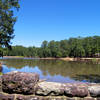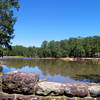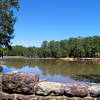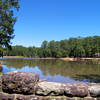



You've probably heard it said that if you live in the Hill Country, you live in a desert. Certainly, it's a funny type of desert — the kind that periodically floods. When it comes to precipitation around here, it's feast or famine. If you ask me, I think it's time for a feast. In fact I'm ready for a seven-course banquet with all the trimmings. No question about it, folks — we need some rain. Lots of rain. Enough rain to clean out the gullies. Enough rain to float horse apples. Enough rain to float Noah's Ark. Shoot — by the time this story gets into print, and into your hands, I hope the heavens have opened, torrents have poured from the skies, and all our lakes stand full, lapping eagerly at the spillways.
But don't bet on it.
However, here's something that you should bet on: Lake Bastrop. Because this 50-year-old reservoir cools two LCRA power plants, it's more or less drought proof — the lake level doesn't fluctuate more than a foot or two. Located only a half hour east of Austin, it's close in, convenient, and home to some of the most consistent bass fishing in Central Texas. To top it off, this 906-acre lake is a thing of beauty — an oasis in the heart of the Lost Pines.
Before I forget, you should know there's trouble in paradise. The problem is zebra mussels, nasty little creatures originally found in Eastern Europe. With no natural enemies here they can take over a lake, crowding out native species, blocking pipelines, and clogging up water intakes. Unfortunately zebras have already infested Lake Bastrop. When the baby mussels first hatch, they're microscopic free swimmers. There's no way you can see them, but the sneaky little devils are in the water and if you don't clean your boat they'll use it to hitchhike to other lakes. Now listen up — this is important! We have to keep these alien mollusks from spreading. The problem is bad – so much so that someone came up with the slogan, "Hello Zebra Mussels; Goodbye Texas Lakes!" They're a genuine threat to the water supply of an already thirsty state. So promise me this: before you decide to launch your craft in Bastrop — or any lake known to harbor zebras — commit yourself to a complete boat cleanup after your outing. For more information check out these websites: http://www.tpwd.state.tx.us/fishboat/boat/protect_water/ and http://www.texasinvasives.org.
Unpleasantries aside, if you're looking for a classic black bass lake you're in the right place. Unlike so many of our Hill Country fishing holes, Bastrop has a wealth of aquatic vegetation that offers cover for baitfish. And that creates a happy hunting ground for top-of-the-food-chain predators like Mr. Largemouth. Regarding real estate, you've heard it said that the three most important things are "location," "location," and "location." So it is for those who seek prey. Successful riflemen and archers spend a great deal of time and effort scouting their territory for the perfect location before they erect their stands. They'll likely seek out a spot where two game trails cross, within 100 yards or so of an area where whitetails regularly feed. Finally, hunters are careful to site their stands where they can get a clear shot when a deer shows up.
This principle is even more important for underwater hunters. If human Nimrods don't get a shot, there's no problem. They weren't depending on game for dinner. They can stop for burgers, or go home and open the fridge. But miss a bluegill, and the largemouth goes hungry. Miss dinner often enough, and it starves to death. So, a bass that's smart enough to survive is smart enough to maximize its chances for success. It's going to hunt where the baitfish hang out. On a classic black bass lake like Bastrop, those prime locations are stumps, weed beds, underwater points, creek channels, drop-offs, and submerged tree trunks along the bank. So find a place where they can lurk in ambush, and you'll find a good place to catch fish.
Lake Bastrop abounds in bass cover. The day I took the photos for this article, I was fishing with old buddy Clark Jackson. I always learn a lot when I watch a master at work and Clark is an artist with the plastic worm. On Bastrop he rigs it Texas-style. Such a worm is more or less weedless. You can toss it back into the thickest weeds without worrying about a hangup. The thicker the lettuce, the heavier your sinker should be in order to let the worm fall through. As the biggest bass often inhales the lure while it's descending and your line is slack, it's very important to watch your line. It's quite possible that the bite will be so subtle you won't feel a thing. If your line twitches, or starts to move slowly, set that hook — Now! After more than fifty years at this game, Clark's left arm is so strong and his reflexes so keen, he has to watch it or he'll snap his line on the hook set. And he catches lots of fish.
I've always preferred to catch my fish on top, so I like to work weed lines with a floating lure like my old favorite Zara Spook. If you've never fished a Zara or any of the similar cigar-shaped floaters, you need to learn how to "walk the dog." The lure itself has no inherent action, so here's what you do. Give it a short tug, and immediately drop your rod tip to put slack in your line. The lure will jump forward slightly, and the slack line will allow the front of the lure to deflect so that the entire plug rotates about 90 degrees to either the right or the left. Watch the lure carefully, and just as it reaches the furthest point of its arc, give it another short tug. It'll jump forward again, this time rotating in the opposite direction. Continue with the short tugs and you'll soon learn to time it so the lure moves slowly toward you, constantly swirling to the left and right. It's a killer lure and a fun way to fish. I highly recommend it.
The day Clark and I fished we met another angler who swore by weedless, floating imitation frogs. He told me one of his techniques was to cast the frog up into the grass and slowly work it back. Another was to cast into open water parallel to a weed bed, just as close to the grass as possible, and again retrieve with slow, tantalizing twitches.
Summertime brings hot weather so the bass will go deeper, especially in the middle of the day. Conventional wisdom says go with top waters early and late, mid-depth lures during mid-morning, and fish deeper with Carolina rigs or heavy jigs when the sun is high overhead — not a bad plan. But whatever's your favorite fishing method, I think you'll like Bastrop.
Like I said — it's a good bet!



